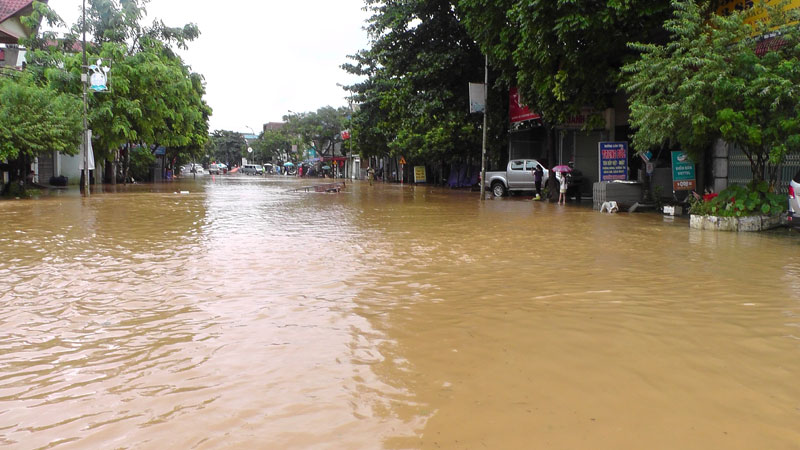
(HBO) – The Ministry of Transport renovated and expanded National Highway 6 in 2002 to facilitate trade activities in the northwestern region and improve local living standard. After more than a decade and a half, the road’s sections crossing Cao Phong district has been degraded. The sections from km 88+670 to 90+250 passing Zone 3 and Zone 4 of Cao Phong township have suffered flooding after lengthy heavy rains which cause many difficulties and danger to people and vehicles traveling on the road.
Torrential rains have usually triggered water logging of 1 – 1.5
metres in the area. Last month, due to the impact of Typhoon Son Tinh, Cao
Phong township was submerged deep in the flowing water, leading to serious
traffic disruption. Water overflowing from Dac Tra Lake, located 2 km away from
the township, was the main cause of the flooding. The flood has gone down very
slowly as the drainage system is in bad condition and out of work. However,
local authorities have not come up with an effective solution to fix it, so locals
had to live with the flood every year.

Flooding
in Cao Phong township.
Pham Duc Tien, a resident in Zone 3, Cao Phong township, who has
lived here since 1959 said this area has never seen flooding before, but now
three or four days of rains can make it flooded. In voters’ meetings, he and
other residents have raised concern over the flooding with the local government
but the situation has not improved.
After torrential rains struck the areas from July 19 – 21, nearly
100 houses here were submerged in flood water. In addition to overflowing water
from Dac Tra Lake, it was due to the fact that people living along the road
have covered the sewer with concrete, preventing water from draining away.
The district’s traffic safety committee has requested those
households to remove their illegal construction works to clear the drainage./.
More than just an information technology teacher, Bui Van Nien is an inspiring figure who has nurtured the scientific curiosity and creative spirit of students in Vietnam’s ethnic minority communities.
Da Bac is the most disadvantaged mountainous district in Hoa Binh province, with ethnic minorities accounting for about 90% of its population. Over the past years, the district has mobilised resources to implement ethnic policies to improve the quality of life of local people.
In recent years, Hoa Binh province has consistently prioritised the protection, care, and education of children, particularly those from ethnic minorities and disadvantaged backgrounds, by creating a safe, healthy, and nurturing environment for their all-round development.
The Steering Committee for Tobacco Harm Prevention and Control of Hoa Binh province, in coordination with the Tobacco Harm Prevention and Control Fund, held a ceremony on May 28 in response to the World No Tobacco Day (May 31) and the National No Tobacco Week (from May 25 to 31). The event was chaired by Nguyen Van Toan, Standing Vice Chairman of the provincial People’s Committee and head of the Steering Committee.
Since 2021, the Center for Industrial Promotion and Industrial Development Consulting (CIIDC) under the Department of Industry and Trade has been implementing a school lighting model as part of the plan for using energy efficiently and economically in Hoa Binh Province in the pẻiod of 2021 - 2025. This model not only aims to improve the learning conditions and enhance the education quality, but it also promotes the message of energy saving, energy security, environmental protection and contributes to the goals of socio-economic development.
In the 2024 - 2025 school year, the entire Hoa Binh provincial education sector includes 520 educational institutions and schools. Among them are 13 ethnic boarding schools with 153 classes and 4,487 students. Four of these schools have met national standards, reaching 30.7 percent.



